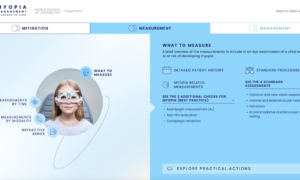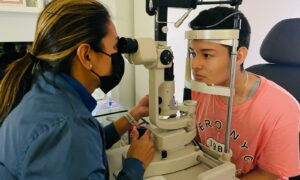August 1, 2022
By Dwight Akerman, OD, MBA, FAAO, FBCLA, FIACLE

Children with myopia experience significantly higher levels of depression and anxiety than their peers without vision impairment, according to a recently published systematic review and meta-analysis by Li et al.
An estimated 19 million children below the age of 14 years have a visual impairment, defined as best corrected vision less than 20/40 or 6/12. Children with vision impairment tend to participate in fewer physical activities, have lower academic achievement, and are more socially isolated. Due to these reasons, vision impairment may adversely affect children’s mental health. Depression and anxiety are two common psychiatric disorders associated with vision impairment. Beyond vision impairment, common chronic ocular morbidities such as strabismus may also cause adverse cosmetic, functional, and psychological consequences among children.
The authors searched nine electronic databases from inception to February 18, 2021, including observational and interventional studies assessing whether vision impairment and/or ocular morbidity and their treatment are associated with depression and/or anxiety in children. In total, 36 studies were included in the systematic review.
Vision-impaired children experienced significantly higher scores of depression and anxiety than normally sighted children. In particular, myopic children experienced higher scores of depression than normally sighted children. Interventional studies showed that treating strabismus could improve mental health, including depression and anxiety.
The researchers concluded that their findings have importance for health care planners designing interventions and prioritizing resource allocation. They suggest that further RCTs on myopia correction and its impact on mental health are needed to identify strategies to improve myopic children’s mental health. This research also underscored the importance and potential impact of early detection and treatment of strabismus in children and provides evidence in favor of insurance coverage for timely strabismus surgery to help improve children’s overall health and, in turn, decrease costs for future mental health disorders.
Abstract
Impact of Vision Impairment and Ocular Morbidity and Their Treatment on Depression and Anxiety in Children: A Systematic Review
Dongfeng Li, MMed, Ving Fai Chan, PhD, Gianni Virgili, PhD, Prabhath Piyasena, PhD, Habtamu Negash, Noelle Whitestone, Sara O’Connor, MD, Baixiang Xiao, MD, Mike Clarke, PhD, David H. Cherwek, MD, Manpreet K. Singh, MD, MS, Xinshu She, MD, MPH, Huan Wang, PhD, Matthew Boswell, S. Grace Prakalapakorn, MD, MPH, Jennifer L. Patnaik, PhD, Nathan Congdon, PhD, MD
Topic: This systematic review and meta-analysis summarize existing evidence to establish whether vision impairment, ocular morbidity, and their treatment are associated with depression and anxiety in children.
Clinical relevance: Understanding and quantifying these associations support early detection and management of mental health symptoms in children with vision impairment and ocular morbidity. Additionally, this review provides evidence in favor of insurance coverage for timely strabismus surgery.
Methods: We searched nine electronic databases from inception to February 18, 2021, including observational and interventional studies assessing whether vision impairment and/or ocular morbidity and their treatment are associated with depression and/or anxiety in children. We used narrative synthesis and meta-analysis with the residual maximum likelihood method. A protocol was registered and published on The International Prospective Register of Systematic Reviews (PROSPERO, CRD42021233323).
Results: Among 28,992 studies, 28,956 (99.9%) were excluded as duplicates or unrelated content. Among 36 remaining studies, 21 (58.3%) were observational studies concerning vision impairment, eight (22.2%) were observational studies concerning strabismus, and seven (19.4%) were interventional studies. Vision-impaired children experienced significantly higher scores of depression (Standard Mean Difference [SMD] 0.57, 95% Confidence Interval (CI) 0.26-0.89, 11 studies) and anxiety (SMD 0.61, 95% CI 0.40-0.821, 14 studies) than normally sighted children. In particular, myopic children experienced higher scores of depression (SMD 0.59, 95% CI 0.36-0.81, six studies) than normally sighted children. Strabismus surgery significantly improved symptoms of depression (SMD: 0.59 95% CI 0.12-1.06, three studies) and anxiety (SMD: 0.69 95% CI 0.24-1.14, four studies) in children.
Discussion: Among children, vision impairment is associated with greater symptoms of depression and anxiety. Surgical treatment of strabismus improved these symptoms. Further randomized controlled trials exploring the impact of public health measures for myopia correction on mental health in children are needed. Scaling up access to strabismus surgery could improve the mental health of affected children.
Li, D., Chan, V. F., Virgili, G., Piyasena, P., Negash, H., Whitestone, N., … & Congdon, N. (2022). Impact of vision impairment and ocular morbidity and their treatment on depression and anxiety in children: A systematic review. Ophthalmology.
DOI: 10.1016/j.ophtha.2022.05.020













